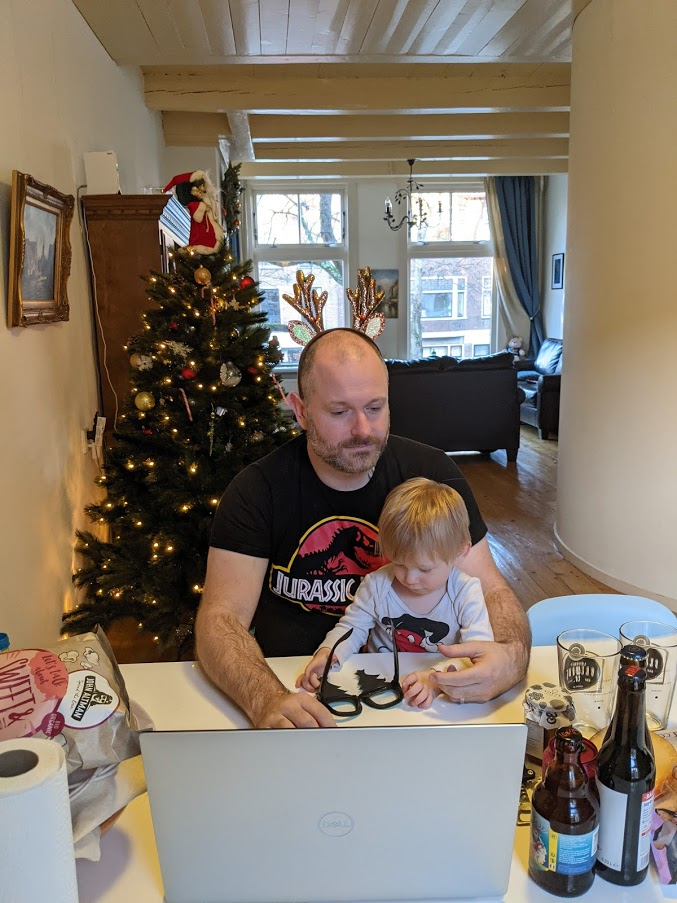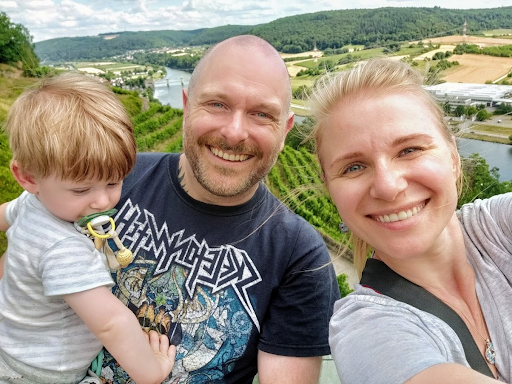1. Hey, can you please introduce yourself?
Hey there, I’m Jason Yavorska and first I’d like to thank you for the opportunity to share my story. I’ve been doing remote work as a Product Manager for the last three years, two and a half at GitLab which has been one of the pioneers in doing all-remote really well. I feel so fortunate to have had the opportunity to have been there for a couple of years even before COVID came around, so I was well-prepared for working in that way, and now starting my own business to help teams do remote and async work well.
These days I’m at Beerwulf as CPTO, a more traditional company that I’m helping (amongst other things) to get results in a planned hybrid remote model. I’ve also started a side project, an asynchronous meeting replacement app, called AsyncGo which is still pre-launch but I hope to be able to share some big news on that front next month.
As for me personally, I am an American citizen but live in the Netherlands. I came to Europe because I used to love traveling to the EU so much that it became at one point cheaper to just move here. I live here with my wife, who is from Ukraine, and my one year old son who was born here. I love music, history, art, and technology. I’ve been trying to take advantage of quarantine days to get better at piano and chess, but with pretty mixed results so far.

2. What motivated you to choose remote working?
It actually for me was sort of random. I chose GitLab based on their vision and potential, but had never worked remotely before so didn’t really know what I was getting myself into. Sadly I don’t have a deep answer because I sort of stumbled into it, but I will just say that it was the one of the luckiest breaks in my life that it worked out that way.
3. What were your initial months like? Did it live up to your expectations?
Initially I had to re-learn a lot. I was always the kind of person who was closely connected to everyone, having little conversations here and there in the hallways and building up a consensus that was not written down anywhere, but was in everyone’s heads. Working remotely, that way of working just doesn’t get results. There’s too many people in too many time zones and with too many ways of connecting that you really have to write everything down. And, if I’m honest, in the end writing things down caught a lot of edge cases around decisions that you might have otherwise glossed over. It took some time though to really appreciate this difference.
Another difficult aspect was that I temporarily lost the ability to “read the room”. I definitely put my foot in my mouth a few times pushing for some result or outcome that either was too aggressive, or didn’t fit with the culture, and was just wrong. Fortunately one of the things that my new colleagues had already learned, and I came to know as well, is that you need to be extra patient with the new folks and be careful to not make them afraid of speaking out or being wrong.
Everyone should be encouraged to share their thoughts and talk it through. For one it helps you avoid “but this is how we’ve always done it here” thinking, but more importantly it ensures you have a culture of communication and engagement which is absolutely critical for teams working remote.
4. How did you find remote working roles?
I don’t have a lot of experience yet on this front since I lucked into my role at GitLab, joined a local company in my next role, and am founding my own all-remote company as a side project. What I do know is that there are several job boards now that focus on remote working jobs, and more and more regular jobs that you might find on the traditional job boards allow for remote or at least hybrid possibilities.
5. What have been the best, good and worst aspects of remote working for you?
In my time at GitLab I was doing a lot of traveling – I would probably spend half the year each year out of my home country & the visiting various countries. As someone who loves travel, history, and food, even if I was in my rental for the workdays, being able to get out in a new place and visit little sites and restaurants here and there, and enjoy the weekends for bigger adventures, was just one of the most enriching experiences of my life. I met my wife in fact while on one of these trips, so who knows where I would be these days without remote work.
The other big important aspect for me, which of course ties into the above, is time with family. At around the time when my older daughter was born I was at a big Fortune 500 company that really pushed people to work long hours to demonstrate their commitment to the company. Sure, they’d reward you for it, but in the end I missed my daughter’s first milestones and that much working contributed to the ultimate divorce that I went through. Having remarried now, with a new young son, and seeing how different things are when we spend our days together and I’m around to support the family more than just by making sure they have a beautiful home and everything they need (except access to me), I just want the same thing for everyone. This is what inspired me to start my own company to make async work easier – I want to give everyone access to this benefit.

The only thing that has been a bit difficult for me when it comes to remote work is making friends. I recently moved to a new city and normally you’d be able to rely on your colleagues to meet people, but with remote work plus the lockdown I haven’t been able to make any new friends here yet. Once things open back up a bit though my plan is to meet people through local volunteering and events, and so we will see how that goes. It would be interesting if someone started providing some kind of service to help remote workers who happen to be in the same city to meet each other.
6. What tools do you swear by while working remotely?
GitLab is my go-to for anything remote. It’s a complete DevOps tool, built for remote teams, by an all-remote team, and with all those learnings built-in. You really can’t go wrong with that, and I think more and more people are going to realize how far ahead of the game they are in supporting remote workflows for software teams. Every day they are tuning their processes and practices for working remotely, and then merging those into the product. It’s really amazing.
Apart from that, and apart from the obvious things like Zoom for meetings, I think recording videos to share your thoughts/make meetings available to anyone who wasn’t able to attend is great. You don’t need much for this, I just upload and share private YouTube videos. Why reinvent the wheel or pay for another product when the world’s best video distribution network is available for free?
In the meantime there’s a ton of innovation happening in the remote tools space and I’m excited to see what people come out with in 2021.
7. Your most exciting/ hilarious experience since you started working remotely.
The funniest thing has to be when you finally meet people in person for the first time. Everyone’s a little shorter or taller than you thought they were, and it is quite a strange feeling to have all these people that you’re used to seeing just their faces in little boxes interacting with each other and seeing how they carry themselves and what they are like in person. In some ways it feels like you’re meeting people from your favorite TV show or something, it’s a little surreal in a good way.
I do believe that you can truly get to know people well over remote, and I have made some really close friendships with people I’ve still never actually met in person, but when you do finally meet it adds another dimension to how you know them.
8. What is your golden advice to a new remote worker?
The most important thing to start with is to put boundaries on your workday. It’s easy to accidentally let work take over, especially in a new role you’re excited about, but the reality is that you are able to get more done working remotely than when you’re in the office and you shouldn’t feel bad about putting a box around your workday.
For me, I lived in Europe and am an early-riser so I’d get started early, work 3 or 4 hours, then take a 2 or 3 hour break with family to go shopping, hang out, or whatever, and then work another 4 or 5 hours in the afternoon to evening.
This was the perfect outline for me, but my advice for everyone is to find their own custom version of their day that tunes their schedule to their own preferences and commitments.
Once you’re settled in, my big advice is to go travel somewhere for a month if you can, and work from there. You may love it, you may hate it, but it’s one of the unique possibilities that remote work can give you and I think that everyone should give it a shot.
9. How do you see your career shaping up and your goals?
I hope to continue to be able to use remote work to balance work and career, and of course now I have my little startup project which ties into remote work as well. As mentioned above, a big part of my role is in teaching my new company how to be effective working under a hybrid model, so in the end I expect remote ways of working to continue to play a big part in my life. There are more and more creative thinkers out there leading the way for remote work, and I hope that I have the opportunity to both partner with them and also contribute to that conversation myself. That would be a wonderful way to spend the remainder of my career – making work better for everyone.
10. How do you expect remote working to evolve in the future?
I think that companies that try to emphasize in-office collaboration are really going to struggle. People have had a taste of the freedom that remote working offers, and have seen that you can be just as productive. I do think that a lot of people are going to still like in-person communication in different ways, but that there will be an expectation that it is on your own terms.
If companies can learn to be effective at giving their employees this freedom, choosing the right moments to encourage the team to be together but allowing for things that can be done remotely/ async to be done in that way, then they are going to attract the best talent, have the happiest employees, and actually be able to achieve more than their competitors because they are able to let their team members focus when it is most natural for them.
11. Where can we follow you on?
– Twitter: @j4yav and @async_go
– AsyncGo